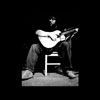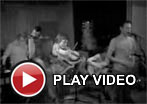Jack Rose, "I Do Play Rock and Roll"
 In 1969, Mississippi Fred McDowell plugged in an electric guitar, and like Bob Dylan just a few years earlier, alienated many purists who could not fathom such radical change. So as not to encourage any ambiguity or doubt, McDowell's first electric record was titled I Do Not Play No Rock 'n' Roll. Whether or not Jack Rose is trying to cure ambiguities of his own with this record is unclear, but it is obvious that he's ready to move into new territory.
In 1969, Mississippi Fred McDowell plugged in an electric guitar, and like Bob Dylan just a few years earlier, alienated many purists who could not fathom such radical change. So as not to encourage any ambiguity or doubt, McDowell's first electric record was titled I Do Not Play No Rock 'n' Roll. Whether or not Jack Rose is trying to cure ambiguities of his own with this record is unclear, but it is obvious that he's ready to move into new territory.Classifying Rose as a pure revivalist has never made much sense, especially considering the scope of his career. Pelt, for instance, was too extravagant and free-spirited to be pigeonholed and his solo output is highly varied despite the fact that John Fahey is the only name I hear associated with him. He is indebted to Leo Kottke and Robbie Basho as much as he is to John Fahey. Perhaps to the untrained ear all these influences will sound similar, but ask any guitarist or pull up any Google search on the topic and you'll get a taste of Rose's diversity. His music exists somewhere between the epic scope of Indian-influenced instrumental music and the roots music of American blues and folk. He is equally cosmic and terrestrial in all that he does and tends to shy away from extremes. It is for this reason that his Three Lobed release sticks out as an oddity. Compiled from live performances in Chicago, Amsterdam, and Pennsylvania, I Do Play Rock and Roll witnesses Rose moving away from his ragtime and blues-inspired mode in order to re-encounter the the hallucinatory and hypnotic power of his early solo output. Truth be told, such experimentation and diversity was present on Dr. Ragtime and His Pals and Kensington Blues, but on I Do Play... the rolling and ethereal qualities of which Rose is capable dominate the comparatively relaxed and familiar sounds of American folk music with which he is so often associated.
To this extent it is difficult to understand why Rose thinks this album has anything to do with rock and roll. His phrasing, tone, and predeliction for intricacy all betray any ties to rock music, not to mention obvious things like the lack of lyrics and regular rhythms. Rose's playing sort of rambles along: it sometimes mumbles and sometimes explodes with clarity and memorable melodies, but it never dissolves into pure improvisation. On "Calais to Dover," which originally appeared on Kensington Blues in an abbreviated form, Rose often falls into introspective movements where quickly fingered rhythms acquire a wave-like quality, rolling as they do in splashes of force and emphasis. His focus is mostly rhythmic throughout the piece and though clear melodies exist, rhythm nevertheless asserts itself as the primary element, forcing the ear to listen for metered patterns instead of melodic or harmonic ones. This song is far and away the best piece on the record and it is arguably its center. "Cathedral et Chartres," also from Kensington Blues, isn't half as long as "Calais to Dover" and runs only a fraction of the time that "Sundogs" does. It is more pastoral and gentle than either tune and, in some ways, occupies its place on the record only to provide relief between the two extremes found on the other songs.
If this album's title is to have any meaning whatsoever, it is to be found somewhere on "Sundogs," the album's final song. It's a 20-plus minute, high-pitched drone apparently extracted from one or more of Rose's guitars. It is cold, steely, and a little frightening with little variation. It provides practically no insight into what Rose might be doing and is generally mystifying from start to finish. There are audible coughs on the recording and it isn't difficult to imagine a few confused and perturbed audience members shuffling about, wondering what it is that Rose is trying to accomplish. In fact, I feel this way listening to the recording. It serves up dark introspection and creeping dread in massive doses, but is the complete antithesis of everything else on the record. Sounding like the complete obliteration of everything Rose has done in the last few years, "Sundogs" is both enjoyable and a little frustrating. Whether or not Rose is signalling a new beginning or simply throwing his listeners something different is up for debate. One thing is clear: if Jack Rose thinks he's playing rock and roll, it's because he's thinking about McDowell and Dylan and what happened when they decided to plug in and change their approach a little.
samples:



